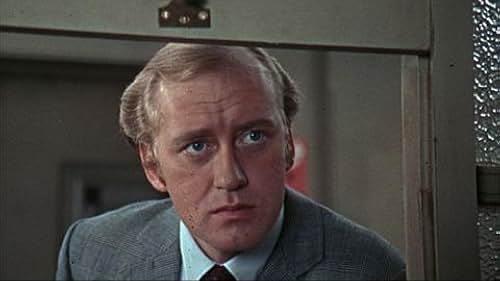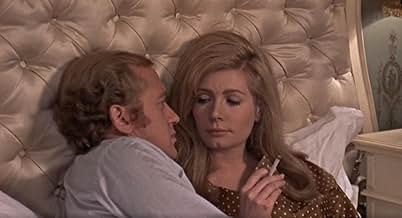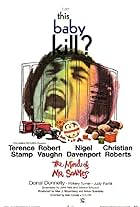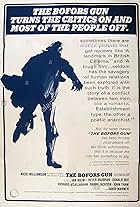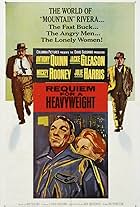Füge eine Handlung in deiner Sprache hinzuMichael Marler, a London businessman, returns to Liverpool after his father's death due to a fight with anglo-saxon teddy boys. As a matter of honor, he seeks revenge without involving the B... Alles lesenMichael Marler, a London businessman, returns to Liverpool after his father's death due to a fight with anglo-saxon teddy boys. As a matter of honor, he seeks revenge without involving the British police.Michael Marler, a London businessman, returns to Liverpool after his father's death due to a fight with anglo-saxon teddy boys. As a matter of honor, he seeks revenge without involving the British police.
Ernest C. Jennings
- Dad (John Joe)
- (as Ernest Jennings)
Empfohlene Bewertungen
50 years ago anti-heroes sold movies, though thankfully not this one. Audiences were delighted that there was no longer a required convention for villains to get caught, and directors exploited the new freedom to excess. This is a prime example of that excess. Our hero is a schizophrenic, one moment delighting in the rich mans trappings - flash car, large property in fashionable Surrey, wife with all the social graces, conventional senior management position in solid London based corporation, the next behaving like a football hooligan when he rediscovers his roots. His treatment of females is so despicable I'm not surprised that distributors wouldn't touch this film.
At the end I wished that I was back in the fifties and that he was the one due the reckoning. No such luck.
The film has some merit for the acting and camerawork but as entertainment it just left a nasty taste in the mouth.
At the end I wished that I was back in the fifties and that he was the one due the reckoning. No such luck.
The film has some merit for the acting and camerawork but as entertainment it just left a nasty taste in the mouth.
I disagree with the first reviewer - this is a bravura performance by Nicol Williamson and much better than 'Get Carter'. As an indication of how much I respected this film, my father was in the film industry in London at the time and I was in Manchester as a student. I saw the film poorly advertised in a small cinema and felt it was wholly spoiled by the poor performance of the film's marketing and distributors. So much so that on leaving the cinema I telephoned my father at once from a call box and told him how highly I rated it. He may have been startled to hear from me as I was the typical uncommunicative student, never writing home.
The film not only has Williamson but also Rachel Roberts giving a good performance, and the ensemble cast does some fine work - there is a brilliant mocking of life in a Virginia Water type of suburbia where all have quality cars in their drives and trite conversation over canapés. It is critical in its style of the mass demolition of the Liverpool slums and is almost elegiac at what is lost thereby, much in the same way as was The Likely Lads TV series. 'Get Carter' is more vulgar, with Michael Caine producing shotguns and leaving bodies about. Williamson is much more earthy - there is a brutal kicking in the film which really makes you wince.
It's also, in its way, a tribute to a kind of Brendan Behan Irishness that was being squeezed out of Britain's cities - the hard-working, hard-living heavy-drinking workers who actually built things with their muscles as opposed to the prissy types who never dirtied their hands. This is why the Williamson character is such an outcast in his smooth London corporate job (in the heart of a City of London that would over the next 15 years also be transformed) but nonetheless effective in his own rough and ready blunt way.
One superb moment is at the end of the film when Williamson driving his Jaguar at breakneck speed has jumped a Stop sign at a roadworks and is racing down a single track sure that oncoming traffic must be starting his way shortly. He just gets away with it, at the expense of a few traffic cones and similar, and one of those in the car says words to the effect "If you can get away with that, you can get away with anything". As he does (I won't spoil the plot by saying more). This is not a sanitized look at Liverpool but a cold stare. Jack Gold made a great film here and it deserved better of its distributors who did not have faith in the product.
The film not only has Williamson but also Rachel Roberts giving a good performance, and the ensemble cast does some fine work - there is a brilliant mocking of life in a Virginia Water type of suburbia where all have quality cars in their drives and trite conversation over canapés. It is critical in its style of the mass demolition of the Liverpool slums and is almost elegiac at what is lost thereby, much in the same way as was The Likely Lads TV series. 'Get Carter' is more vulgar, with Michael Caine producing shotguns and leaving bodies about. Williamson is much more earthy - there is a brutal kicking in the film which really makes you wince.
It's also, in its way, a tribute to a kind of Brendan Behan Irishness that was being squeezed out of Britain's cities - the hard-working, hard-living heavy-drinking workers who actually built things with their muscles as opposed to the prissy types who never dirtied their hands. This is why the Williamson character is such an outcast in his smooth London corporate job (in the heart of a City of London that would over the next 15 years also be transformed) but nonetheless effective in his own rough and ready blunt way.
One superb moment is at the end of the film when Williamson driving his Jaguar at breakneck speed has jumped a Stop sign at a roadworks and is racing down a single track sure that oncoming traffic must be starting his way shortly. He just gets away with it, at the expense of a few traffic cones and similar, and one of those in the car says words to the effect "If you can get away with that, you can get away with anything". As he does (I won't spoil the plot by saying more). This is not a sanitized look at Liverpool but a cold stare. Jack Gold made a great film here and it deserved better of its distributors who did not have faith in the product.
Indicator are a small British blu-ray label who seem to have made it their ultimate goal to unearth some of the best and weirdest forgotten gems from Britain's cinematic past, routinely releasing titles I've never even heard of that turn out to be well worthy of a remaster and rediscovery. One such title is Jack Gold's The Reckoning, a tough, lean thriller about a no-nonsense businessman who travels up North seeking vengeance. Sound familiar? The Reckoning has been compared to Get Carter, which was released the following year, and the two films certainly share some similarities. Yet tonally and thematically the two are worlds apart, with Gold's film more eager to explore class divide and national identity than Carter's more straightforward revenge fantasy. The Reckoning may also be the better film: a punishing experience full of off-putting characters that leaves more of a lasting impression than what many consider to be Michael Caine's finest hour.
It tells the story of Mick Marler (Nicol Williamson), a corporate ball-buster who has worked his way up the ladder over the years with a combination of ruthless business savvy and sheer intimidation. He seems satisfied with his high income and strong social standing, but also has a button-pushing, gold-digging wife (Ann Bell) to contend with. After putting the pieces in place for a business manoeuvre that will favour both himself and his boss (as well as doing away with his biggest rival), Mick heads up north to Liverpool to visit his working-class Irish family. Immediately upon arrival, he discovers his father has died from a heart attack, but is disturbed when he discovers bruising on his father's body. After doing some digging, Mick learns that his father got into a fight with some English 'teddy boys', suffering the fatal heart attack after being punched and kicked to the ground by one of the gang. With his Irish blood boiling inside of him, Mick decides that he must avenge his father, but he also has responsibilities back home.
Torn between his two worlds, Mick goes on a journey of self-discovery that ultimately makes him even more loathsome. When he is in the South, he laughs at the idea of being bound by blood and tradition to avenge his father, but when he is back North, a beast is awoken inside him, and he is irresistibly drawn to embracing his primitive instincts. It's a tough, ugly film that asks you to stick with this part-thug, part-corporate psychopath for just shy of two hours, but John McGrath's screenplay - based on the novel by Patrick Hall - trusts the audience to at least try to understand the man who breezes between two equally brutal, yet entirely different, worlds. This isn't action-packed or even violent as you would expect from a man-on-a-revenge-mission movie, but takes its time to develop this hateful yet fascinating character who used his working-class upbringing to batter his way into the world of lavish dinner parties and fast cars, and was both intrigued and repulsed by what he found. Williamson is excellent, managing to emote both outer ferocity and inner turmoil at the same time, and it's a puzzle why the actor didn't go on to land bigger roles. While it's chaotic at times, The Reckoning is a true forgotten gem that highlights how important the work carried out by Indicator really is.
It tells the story of Mick Marler (Nicol Williamson), a corporate ball-buster who has worked his way up the ladder over the years with a combination of ruthless business savvy and sheer intimidation. He seems satisfied with his high income and strong social standing, but also has a button-pushing, gold-digging wife (Ann Bell) to contend with. After putting the pieces in place for a business manoeuvre that will favour both himself and his boss (as well as doing away with his biggest rival), Mick heads up north to Liverpool to visit his working-class Irish family. Immediately upon arrival, he discovers his father has died from a heart attack, but is disturbed when he discovers bruising on his father's body. After doing some digging, Mick learns that his father got into a fight with some English 'teddy boys', suffering the fatal heart attack after being punched and kicked to the ground by one of the gang. With his Irish blood boiling inside of him, Mick decides that he must avenge his father, but he also has responsibilities back home.
Torn between his two worlds, Mick goes on a journey of self-discovery that ultimately makes him even more loathsome. When he is in the South, he laughs at the idea of being bound by blood and tradition to avenge his father, but when he is back North, a beast is awoken inside him, and he is irresistibly drawn to embracing his primitive instincts. It's a tough, ugly film that asks you to stick with this part-thug, part-corporate psychopath for just shy of two hours, but John McGrath's screenplay - based on the novel by Patrick Hall - trusts the audience to at least try to understand the man who breezes between two equally brutal, yet entirely different, worlds. This isn't action-packed or even violent as you would expect from a man-on-a-revenge-mission movie, but takes its time to develop this hateful yet fascinating character who used his working-class upbringing to batter his way into the world of lavish dinner parties and fast cars, and was both intrigued and repulsed by what he found. Williamson is excellent, managing to emote both outer ferocity and inner turmoil at the same time, and it's a puzzle why the actor didn't go on to land bigger roles. While it's chaotic at times, The Reckoning is a true forgotten gem that highlights how important the work carried out by Indicator really is.
Move over, Michael Caine! Your "Get Carter" might very well be acclaimed around the world and listed as one of the most virulent British cult thrillers ever made, but this obscure and undiscovered (and, at one point, even considered lost) drama/thriller with very reminiscent themes predates your film with nearly two years AND it's a lot more ambitious in terms of character study and social criticism!
Okay, so now that's off my chest Don't get me wrong, I don't have anything against Michael Caine or "Get Carter". Quite the contrary, in fact, but I just want to plea for "The Reckoning" to become more known and loved amongst cult fanatics worldwide! What this puppy needs is a proper and fancy DVD-release, as I'm 200% sure it will appeal to a lot of cult collectors. The film really has it all: an unbelievable intense tour-de-force performance by Nicol Williamson, a grim & gritty contemporary late 60's/early 70's atmosphere, few but exhilarating action sequences and numerous of mind-boggling dialogs. Michael Marler is a successful businessman in London, but in spite of all his power and money he is bitter (especially in his marriage with the beautiful Rosemary), merciless (especially in his job as a sales executive) and aggressive (especially behind the wheel of his car). He is frustrated because he grew up as an oppressed Irishman in the intolerant city of Liverpool and still doesn't manage to put this tough period behind him. Michael returns to Liverpool to see his dying father, but arrives too late. When he learns that his father's death was actually the result of a cowardly assault by young British thugs, his outrageous Irish temper comes to the surface again. But Michael's retro-metamorphosis also has severe consequences when he's back in London. "The Reckoning" is a giant spitfire of highlights, one sequence even more powerful and intense than the next. Unforgettable moments include a Liverpool wrestling match and a party full of vainglorious guests at the Marler residence. And just when you think "The Reckoning" can't get anymore cooler, just wait until you witness the very last sequence. Mr. Marler is a truly unique persona, to say the least. The more employees he intimidates and he more women he seduces, the more you will cheer for him. Williamson, most known for supportive roles and stage plays, gives one of the most underrated performances in cinema history.
Okay, so now that's off my chest Don't get me wrong, I don't have anything against Michael Caine or "Get Carter". Quite the contrary, in fact, but I just want to plea for "The Reckoning" to become more known and loved amongst cult fanatics worldwide! What this puppy needs is a proper and fancy DVD-release, as I'm 200% sure it will appeal to a lot of cult collectors. The film really has it all: an unbelievable intense tour-de-force performance by Nicol Williamson, a grim & gritty contemporary late 60's/early 70's atmosphere, few but exhilarating action sequences and numerous of mind-boggling dialogs. Michael Marler is a successful businessman in London, but in spite of all his power and money he is bitter (especially in his marriage with the beautiful Rosemary), merciless (especially in his job as a sales executive) and aggressive (especially behind the wheel of his car). He is frustrated because he grew up as an oppressed Irishman in the intolerant city of Liverpool and still doesn't manage to put this tough period behind him. Michael returns to Liverpool to see his dying father, but arrives too late. When he learns that his father's death was actually the result of a cowardly assault by young British thugs, his outrageous Irish temper comes to the surface again. But Michael's retro-metamorphosis also has severe consequences when he's back in London. "The Reckoning" is a giant spitfire of highlights, one sequence even more powerful and intense than the next. Unforgettable moments include a Liverpool wrestling match and a party full of vainglorious guests at the Marler residence. And just when you think "The Reckoning" can't get anymore cooler, just wait until you witness the very last sequence. Mr. Marler is a truly unique persona, to say the least. The more employees he intimidates and he more women he seduces, the more you will cheer for him. Williamson, most known for supportive roles and stage plays, gives one of the most underrated performances in cinema history.
I am 57 years old. and have been a film fan all my life.
I have seen many many films but until yesterday I had not seen this film.
I give no spoilers but the film involves family loyalty,personal ambition and an Irish Catholic background in Liverpool in the late 1960s.
It features great acting from actors and actresses that I had not seen much of before.
This film is out on blu ray and I intend to buy it as soon as I can.
If you like Kes and Get Carter and Villain you need to seek this one out.
It is currently on Talking Pictures channel in the UK
I give no spoilers but the film involves family loyalty,personal ambition and an Irish Catholic background in Liverpool in the late 1960s.
It features great acting from actors and actresses that I had not seen much of before.
This film is out on blu ray and I intend to buy it as soon as I can.
If you like Kes and Get Carter and Villain you need to seek this one out.
It is currently on Talking Pictures channel in the UK
Handlung
WUSSTEST DU SCHON:
- WissenswertesThe last cinema film of Malcolm Arnold
- PatzerMost of the home street scenes were filmed in Seacombe, Wallasey, but the cutting of the film makes it a rather impressive walk out the a door after the bed-side scene: from Seacombe back-street, north along Birkenhead's Corporation Road, then back across the docks into Seacombe via the Four Bridges, ending up on the Liverpool side in the next cut.
- Zitate
Sir Miles Bishton: [sneering] I never knew you were Irish, Marler.
[Mick hits him in the face]
- SoundtracksBelieve Me, If All Those Endearing Young Charms
[Trad.]
[Lyrics by Thomas Moore]
Top-Auswahl
Melde dich zum Bewerten an und greife auf die Watchlist für personalisierte Empfehlungen zu.
- How long is The Reckoning?Powered by Alexa
Details
- Laufzeit1 Stunde 49 Minuten
- Seitenverhältnis
- 1.75 : 1
Zu dieser Seite beitragen
Bearbeitung vorschlagen oder fehlenden Inhalt hinzufügen


